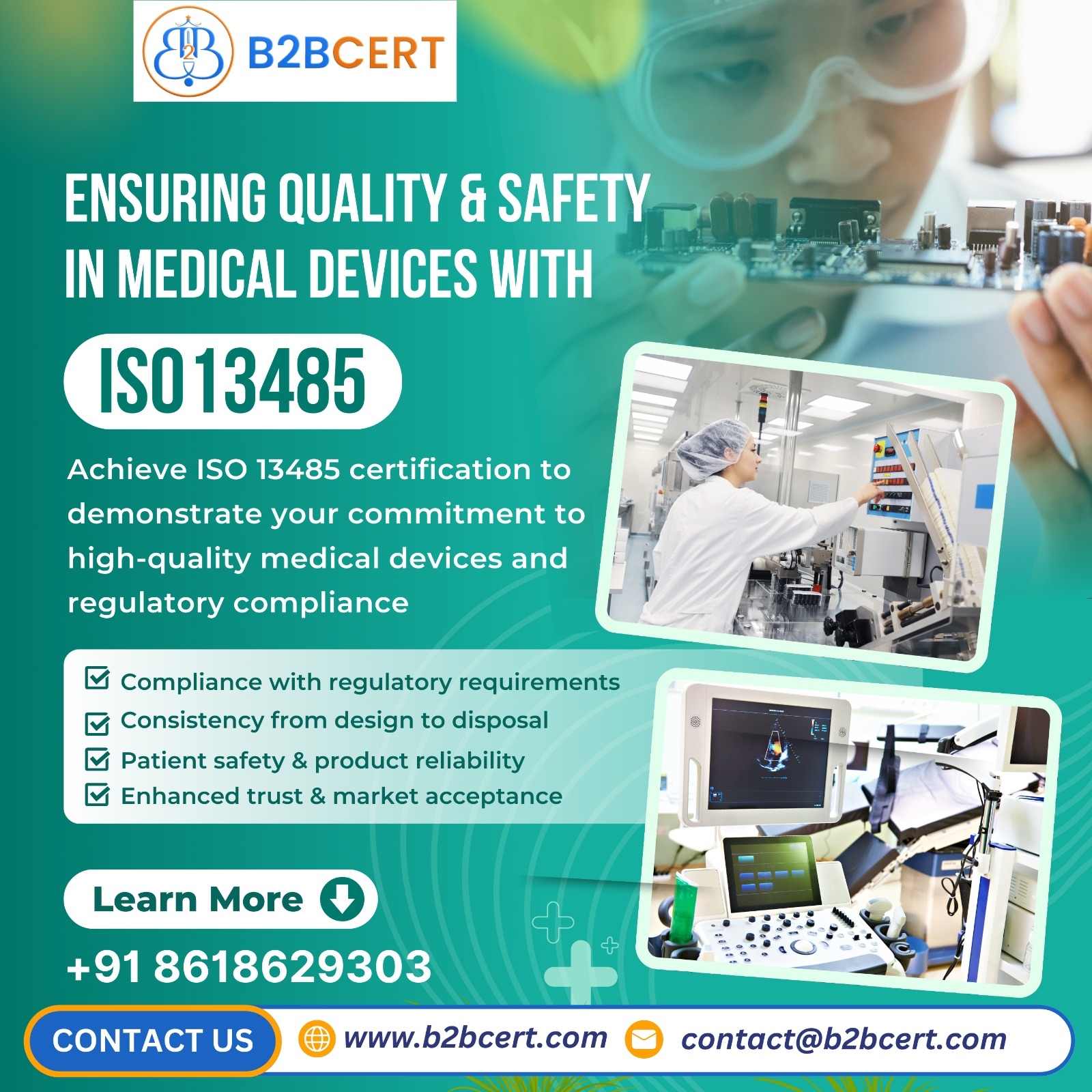What Benefits Does ISO 13485 Certification Offer to Companies Operating Across Oman’s Key Industries?

ISO 13485 Certification in Oman is an internationally recognized standard that outlines requirements for a Quality Management System (QMS) specifically tailored to the medical device industry. It focuses on the design, development, production, installation, and servicing of medical devices, and ensures that organizations consistently meet customer and regulatory requirements.
While it aligns closely with ISO 9001, ISO 13485 places greater emphasis on risk management, regulatory compliance, product traceability, and maintaining sterile conditions—making it essential for companies in health-related sectors.
1. Enhanced Product Quality and Safety
At its core, ISO 13485 helps organizations build high-quality, safe medical products. Through strict process controls, risk assessments, and documentation requirements, companies reduce the chances of defects, recalls, and product failures.
In Oman, where the healthcare sector is growing rapidly and the demand for reliable medical equipment is increasing, ISO 13485 enables companies to deliver safer, more consistent products to hospitals, clinics, and pharmacies.
2. Access to International Markets
ISO 13485 Services in Oman is a globally recognized standard. Many international buyers, distributors, and regulatory agencies require certification as a prerequisite for doing business. By obtaining ISO 13485, Omani companies can gain access to markets in the European Union, United States, Canada, and the Middle East.
This is especially beneficial for medical manufacturers, suppliers, and exporters operating in free zones like Knowledge Oasis Muscat (KOM) and Sohar. Certification provides a competitive edge in tendering processes, partnerships, and supply chain collaborations.
3. Improved Regulatory Compliance
Healthcare is a heavily regulated industry. Oman’s Ministry of Health and other regional authorities require strict adherence to medical safety and quality standards. ISO 13485 Certification Services in Oman helps companies align with both local laws and international regulatory requirements.
The standard ensures that companies follow documented procedures, maintain product traceability, perform internal audits, and implement corrective actions. These practices make it easier to pass inspections, avoid penalties, and maintain a strong reputation in the health and medical sectors.
4. Risk Management and Operational Efficiency
ISO 13485 Consultants in Oman incorporates risk-based thinking across the entire product lifecycle—from design and development to production and post-market surveillance. This proactive approach helps companies in Oman:
-
Identify and mitigate risks early
-
Reduce waste and production errors
-
Improve response time to potential safety issues
-
Avoid costly recalls and legal challenges
By optimizing processes and minimizing risks, companies improve both safety and operational efficiency, which leads to better resource management and profitability.
5. Strengthening Brand Reputation
As Omani healthcare companies compete for trust from clients, patients, and partners, ISO 13485 certification serves as a mark of quality and reliability. It demonstrates that an organization is committed to meeting the highest standards of safety and regulatory compliance.
Whether supplying hospitals in Muscat or exporting medical products to neighboring GCC countries, certified businesses gain a reputation for professionalism and accountability—which can translate into stronger relationships and long-term success.
6. Integration with Other Management Systems
Many companies in Oman already implement ISO standards like ISO 9001 (Quality) or ISO 45001 (Health & Safety). ISO 13485 Consultants Services in Oman can be easily integrated with these systems, allowing for a streamlined approach to quality, compliance, and operational excellence across departments.
This unified management system can reduce duplication, simplify audits, and align all areas of the organization under common goals.
Conclusion
ISO 13485 certification is more than a regulatory tool—it’s a pathway to higher quality, safer products, better efficiency, and global growth. For Omani companies working in or alongside the medical and healthcare sectors, this certification unlocks new opportunities while ensuring compliance and excellence in every aspect of their operations.
By adopting ISO 13485, businesses in Oman are not only improving their internal processes—they’re elevating their role in a healthcare ecosystem that depends on trust, precision, and continuous improvement.
- Questions and Answers
- Opinion
- Motivational and Inspiring Story
- Technology
- Live and Let live
- Focus
- Geopolitics
- Military-Arms/Equipment
- Security
- Economy
- Beasts of Nations
- Machine Tools-The “Mother Industry”
- Art
- Causes
- Crafts
- Dance
- Drinks
- Film/Movie
- Fitness
- Food
- Games
- Gardening
- Health
- Home
- Literature
- Music
- Networking
- Other
- Party
- Religion
- Shopping
- Sports
- Theater
- Health and Wellness
- News
- Culture

